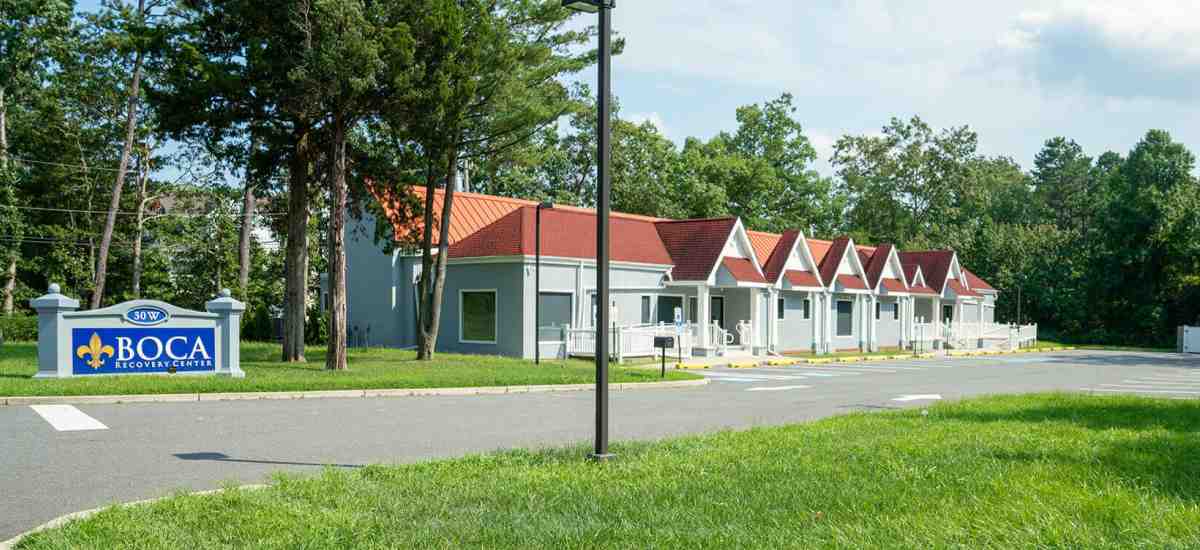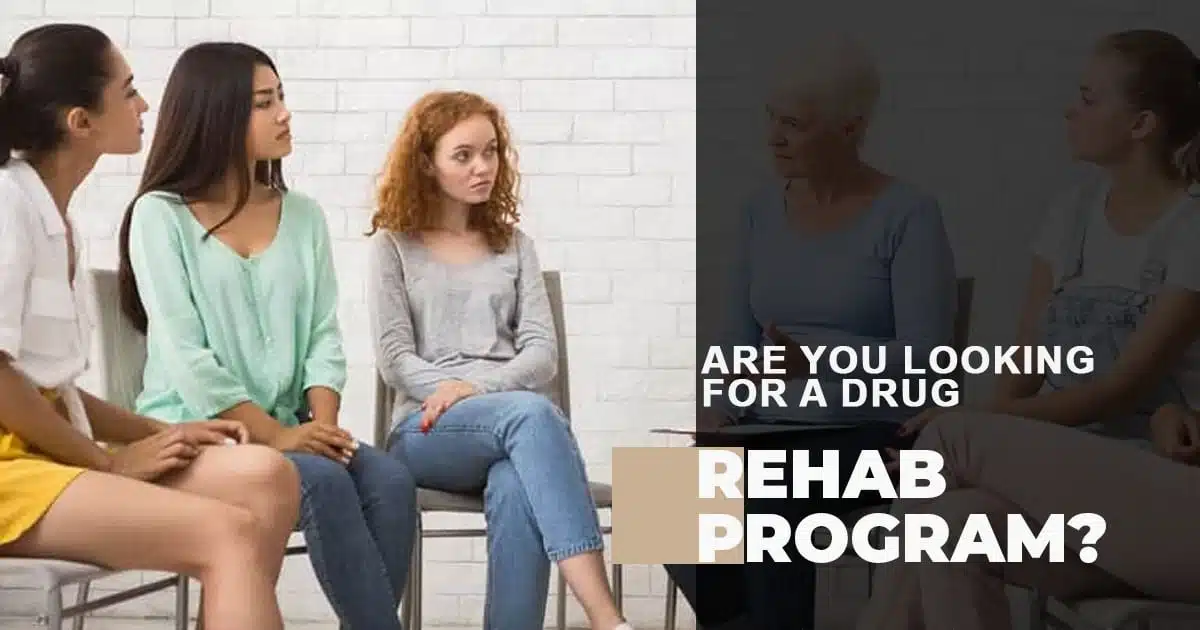
Understanding Drug Rehab Programs: Your Essential Guide to Finding Effective Treatment
Drug rehab programs provide structured treatment for substance use disorders, offering medical support, evidence-based therapies, and recovery tools to help people achieve lasting sobriety. Here’s what you need to know:
Key Types of Drug Rehab Programs:
- Inpatient/Residential Treatment – 24/7 care in a structured, supportive environment for severe addiction
- Outpatient Treatment – Flexible therapy sessions while living at home (less than 9 hours/week)
- Intensive Outpatient Programs (IOP) – Structured treatment requiring at least 9 hours of weekly attendance
- Partial Hospitalization Programs (PHP) – Full-day care providing at least 20 hours of weekly treatment
- Medication-Assisted Treatment (MAT) – Combines FDA-approved medications with counseling for opioid or alcohol use disorders
- Detox Programs – Medically supervised withdrawal management to safely remove substances from the body
What Effective Programs Include:
- Evidence-based therapies like Cognitive Behavioral Therapy (CBT) and Motivational Interviewing
- Individualized treatment plans custom to your specific needs
- Proper state licensing and national accreditation
- Integrated mental health services for co-occurring disorders
- Aftercare planning and ongoing recovery support
The statistics are sobering: in 2021, 46.3 million Americans had a substance use disorder, and over 300 people die daily from drug or alcohol overuse. But there is hope. Research shows that treatment works, with success rates similar to other chronic conditions like diabetes and hypertension. The key factor is duration; patients in treatment for three months or longer are significantly more likely to achieve lasting recovery.
At Addiction Helpline America, we connect individuals with the right drug rehab programs for their unique needs. Our specialists offer 24/7 confidential support and guidance, helping you steer your treatment options and make informed decisions.
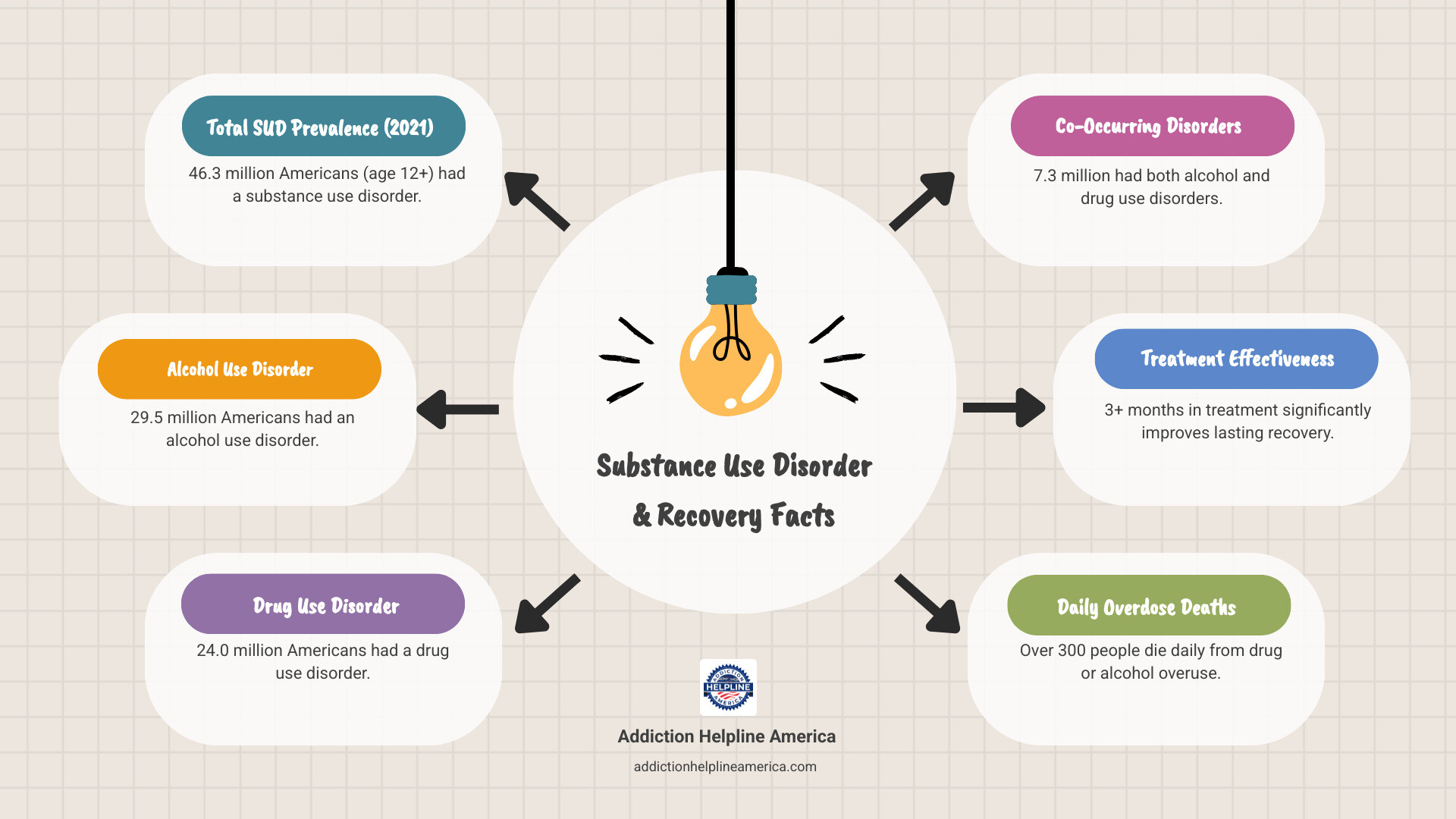
Simple Drug rehab programs glossary:
Understanding the Core Components of Effective Drug Rehab Programs
Choosing a drug rehab program requires understanding what makes treatment successful. Addiction is a complex condition, and effective programs offer a comprehensive approach that addresses its many facets.
Based on extensive research and experience, we’ve identified 10 essential qualities of effective programs. These are not arbitrary checkboxes but the foundation for building lasting recovery. Understanding these components will give you the clarity to evaluate programs objectively, ask the right questions, and find a treatment approach that aligns with your specific needs.
This framework covers everything from the intensity of care and types of therapy to credentials and long-term support systems. Whether you’re researching for yourself or a loved one, these components provide a reliable roadmap for finding the right program for you.
1. A Spectrum of Care Levels (Inpatient vs. Outpatient)
Effective drug rehab programs recognize that everyone’s journey is different, which is why they offer a full spectrum of care levels to meet you where you are.
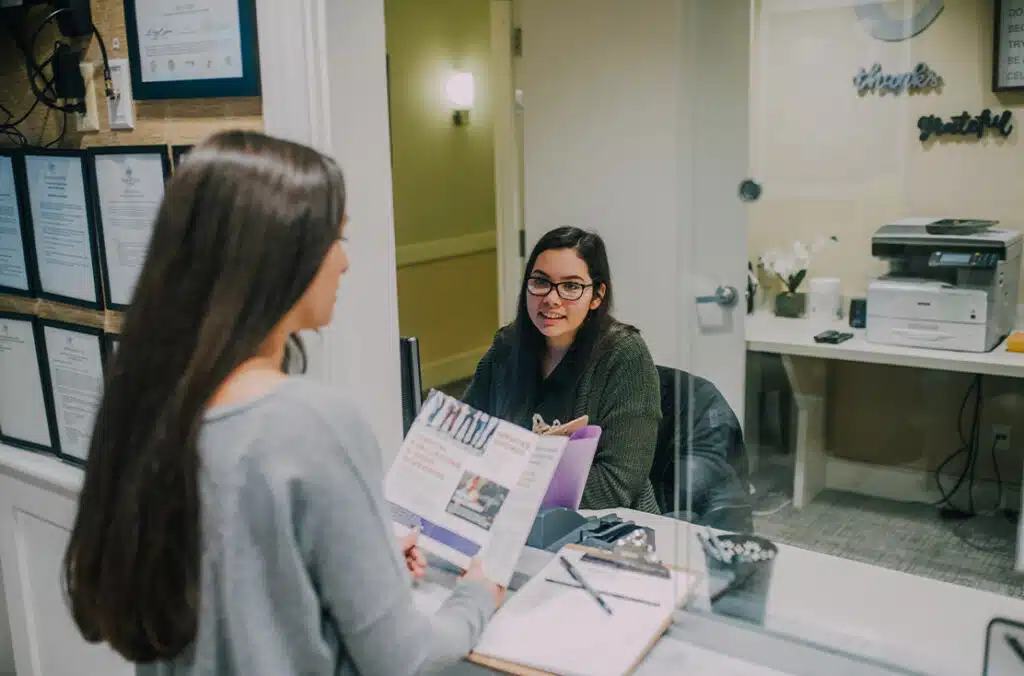
This continuum of care includes:
- Medical Detox: The critical first step for substances like alcohol, opioids, or benzodiazepines. It provides medically supervised care to manage withdrawal safely and comfortably.
- Inpatient/Residential Rehab: This highest level of care provides 24/7 support in a live-in facility, removing you from daily triggers. It’s often recommended for severe substance use disorders or co-occurring conditions. You can explore more info about inpatient options to see if this is right for you.
- Partial Hospitalization Programs (PHP): A step-down from inpatient care, PHPs offer intensive day treatment (at least 20 hours per week) while you return home at night.
- Intensive Outpatient Programs (IOP): Offering at least 9 hours of weekly treatment, IOPs provide structured support while allowing you to maintain daily responsibilities.
- Outpatient Rehab: The most flexible option, standard outpatient involves less than 9 hours of weekly therapy, ideal for those with less severe addictions or strong home support.
The main difference between inpatient and outpatient care is the level of immersion and supervision. The right choice depends on the severity of your substance use, your home environment, and your support network. There is no single “better” option—only what’s better for you.
Call Now – Your Journey to Recovery Begins Today!

Take the first step towards a healthier life! Call now to connect with our compassionate team and start your recovery journey today. Your path to healing awaits!
Our recovery specialists are available 24/7 to provide support, and all calls are confidential and free. Reach out anytime – we’re here to help!
2. Use of Evidence-Based Treatments
When evaluating drug rehab programs, ask what treatments they use. The best programs rely on evidence-based treatments—therapies that have been scientifically tested and proven to work.
Key evidence-based approaches include:
- Cognitive Behavioral Therapy (CBT): Helps you recognize triggers, challenge negative thought patterns, and develop coping skills to manage cravings.
- Motivational Interviewing (MI): A collaborative approach where therapists help you find your own internal motivation for change, which is especially useful for overcoming uncertainty.
- Dialectical Behavior Therapy (DBT): Teaches skills for mindfulness, distress tolerance, emotion regulation, and effective communication, often used for those with intense emotions or trauma.
- Trauma-Informed Care: Recognizes that many people with SUD have experienced trauma. This approach focuses on creating safety and addressing the root causes of addiction.
Effective programs balance individual therapy for personalized work with group therapy, which breaks the sense of isolation and connects you with peers who understand. The National Institute on Drug Abuse (NIDA) has established principles of effective treatment that quality programs follow. If you’re also struggling with depression, it’s important to find a program that can address both; you can learn about depression treatment options that integrate mental health care.
3. Medication-Assisted Treatment (MAT)
For many people with opioid or alcohol use disorders, medication-assisted treatment (MAT) is a crucial component of recovery. MAT combines FDA-approved medications with counseling and behavioral therapies to treat the whole person.
These medications work by managing withdrawal symptoms, reducing cravings, and preventing relapse. This helps stabilize brain chemistry, allowing you to focus on the therapeutic work of recovery.
- For opioid use disorder, common medications include Buprenorphine (Suboxone), which reduces cravings and withdrawal; Methadone, which stabilizes patients in controlled settings; and Naltrexone (Vivitrol), which blocks the effects of opioids.
- For alcohol use disorder, medications include Naltrexone, which reduces cravings; Acamprosate (Campral), which helps maintain abstinence; and Disulfiram (Antabuse), which creates an unpleasant reaction to alcohol.
MAT is not about replacing one drug with another. It is an evidence-based approach that, when integrated into a comprehensive drug rehab program, significantly improves treatment outcomes, reduces overdose deaths, and helps people stay in recovery longer. We can help you find a clinic near you that offers these services.
4. Proper Licensing and Accreditation
When choosing a drug rehab program, verifying its licensing and accreditation is essential. These credentials ensure the facility meets rigorous standards for safety, ethics, and quality of care.
- State licensure is the mandatory baseline. Every facility must be licensed by its state to operate, ensuring compliance with regulations on staffing, safety, and patient rights. Addiction Helpline America only works with state-licensed facilities.
- National accreditation signifies a higher commitment to quality. Organizations like The Joint Commission (JCAHO) and the Commission on Accreditation of Rehabilitation Facilities (CARF) conduct thorough reviews to ensure a program exceeds minimum standards.
These credentials protect you from untrustworthy providers. You can verify them with the facility or use resources like SAMHSA’s state-licensed treatment finder. Our team can also help you connect with properly credentialed programs. For more guidance, see our guide on How to Find the Right Rehab Center.
Proper licensing and accreditation are non-negotiable markers of a reputable drug rehab program that provides safe, effective care.
5. Individualized Treatment Planning

Effective drug rehab programs recognize that your story is unique. They avoid generic, one-size-fits-all approaches and instead create a personalized treatment plan custom specifically to you.
This process begins with a biopsychosocial assessment, a comprehensive evaluation of your:
- Biological factors: Physical health, family history, and substance use patterns.
- Psychological factors: Mental health history, co-occurring conditions, and coping mechanisms.
- Social factors: Living situation, family relationships, work, and support systems.
Based on this assessment, you and your treatment team collaboratively set meaningful treatment goals. These might include achieving abstinence, repairing relationships, processing trauma, or developing healthy stress management skills.
An individualized plan is not static; it evolves as you progress. Through regular progress reviews, your team adjusts the plan to meet your changing needs, ensuring you are always on the most effective path. This collaborative approach empowers you to take an active role in your recovery, which is a powerful motivator for lasting change.
Call Now – Your Journey to Recovery Begins Today!

Take the first step towards a healthier life! Call now to connect with our compassionate team and start your recovery journey today. Your path to healing awaits!
Our recovery specialists are available 24/7 to provide support, and all calls are confidential and free. Reach out anytime – we’re here to help!
6. Defined Program Duration and Structure
How long should treatment last? At Addiction Helpline America, we advise that when it comes to drug rehab programs, longer is almost always better.
While 30-day programs can provide a foundation, research consistently shows that 90-day programs or longer lead to the best outcomes. Patients who remain in treatment for three months or more are significantly more likely to achieve lasting recovery. This is because addiction is a chronic disease model, similar to diabetes or heart disease, which requires ongoing management rather than a quick fix.
Long-term treatment offers several key advantages:
- It gives the brain time to heal from the chemical changes caused by substance use.
- It allows you to practice new coping skills until they become second nature.
- It provides a gradual adjustment to sober living before returning to your daily environment.
For those with complex needs, such as previous relapses or severe co-occurring disorders, even longer stays may be beneficial. Long-term behavioral health facilities can offer six months or more of structured support.
Effective programs also provide a clear daily schedule that balances therapy, education, and recreation. This structure replaces the chaos of addiction with stability and purpose, creating a healthy rhythm for recovery.
7. Comprehensive Aftercare and Alumni Support
Graduating from a drug rehab program is a major milestone, but it’s the beginning of your new life, not the end of your recovery journey. The best programs understand this and provide a comprehensive aftercare plan to support you long-term.
Effective aftercare is a personalized roadmap for navigating life after treatment. Key components include:
- Relapse Prevention Planning: A practical guide created with your therapist to identify your personal triggers and develop concrete strategies for managing them.
- Sober Living Homes: Transitional residences that offer a structured, drug-free environment where you can practice recovery skills while rebuilding independence.
- Alumni Groups and Peer Support: Connecting with others who have shared experiences provides a powerful sense of community and proof that recovery is possible. Peer support specialists, who have their own lived experience, offer invaluable guidance and hope.
- Ongoing Counseling and Step-Down Care: Continuing with therapy reinforces what you’ve learned. Many programs offer a gradual transition from more intensive care (like PHP) to less intensive care (like IOP or standard outpatient), allowing you to build confidence at your own pace.
Research shows that individuals who engage in aftercare have significantly better long-term outcomes. It provides accountability, reinforcement, and a community to support your growth. To learn more, read our guide on What Is Rehab Aftercare?.
8. Integrated Mental Health Services
It’s a critical fact that about half of people with a substance use disorder also have a co-occurring mental illness, such as anxiety, depression, or PTSD. This is known as a dual diagnosis. Treating the addiction without addressing the underlying mental health challenge is like trying to bail water out of a boat while ignoring a hole in the hull—the two conditions feed each other.
That’s why the most effective drug rehab programs offer integrated mental health services. Instead of treating these issues separately, integrated treatment uses a unified team of therapists, psychiatrists, and addiction counselors who work together. They assess and treat both conditions simultaneously, understanding the complex interplay between them.
This coordinated approach ensures that your mental health and addiction recovery are addressed as two parts of a whole. Managing your depression can reduce the urge to self-medicate, while sobriety can improve mental clarity and make therapy more effective. For more information, our Mental Health Helpline Complete Guide offers comprehensive resources and support.
9. Family Involvement and Support Programs
Addiction is often called a family illness because it impacts everyone in a person’s life—parents, partners, children, and friends. The best drug rehab programs recognize this and understand that recovery is most successful when families heal together.
Quality programs offer services designed to repair relationships and build a strong support system:
- Family Therapy: A trained therapist facilitates safe, honest conversations to resolve conflict, improve communication, and begin healing the wounds caused by addiction.
- Educational Workshops: These sessions help family members understand the science of addiction as a chronic medical condition, replacing judgment with compassion and knowledge.
- Communication Skills Training: Families learn healthier ways to express feelings, set boundaries, and resolve disagreements, rebuilding trust and strengthening relationships.
- Codependency Support: Many programs help families identify and change enabling behaviors, learning to support recovery rather than addiction.
- Family Support Groups: Connecting families to peer-led groups like Al-Anon or Nar-Anon provides a judgment-free space to share experiences with others who understand.
The goal is to create a supportive foundation that makes long-term sobriety possible for the individual and promotes healing for the entire family. If you need guidance on supporting a loved one, our article on How to Help a Drug Addict offers practical advice.
10. Specialized Programs for Diverse Populations
Everyone’s path to recovery is different, shaped by their life experiences, culture, and identity. The most effective drug rehab programs acknowledge this by offering specialized tracks for specific populations.
- Veterans: Programs for veterans address co-occurring PTSD and military culture, creating a sense of brotherhood. Our Veteran Addiction Treatment Complete Guide offers more resources.
- Professionals: Confidential treatment for doctors, lawyers, and executives addresses career-related pressures and licensing concerns.
- LGBTQ+ Individuals: These programs provide a safe, affirming environment to process trauma related to discrimination and explore identity without judgment.
- Teens and Adolescents: Treatment focuses on developmental stages, family dynamics, and building life skills. Our guide on Teen Rehab Near Me can help you find options.
- Couples: Specialized programs address intertwined substance use issues, focusing on communication and healing together.
- Gender-Specific Programs: Women-only and men-only programs create safe spaces to address gender-specific traumas and social pressures.
- Older Adults: Programs for seniors consider issues like chronic pain, multiple medications, and social isolation.
At Addiction Helpline America, we help you find a program that specializes in what you need. Recovery isn’t one-size-fits-all, and your treatment shouldn’t be either.
Navigating the Financial Aspect of Rehab
Concerns about the cost of drug rehab programs should never be a barrier to seeking help. Treatment is an investment in your future, and multiple pathways exist to make it affordable.
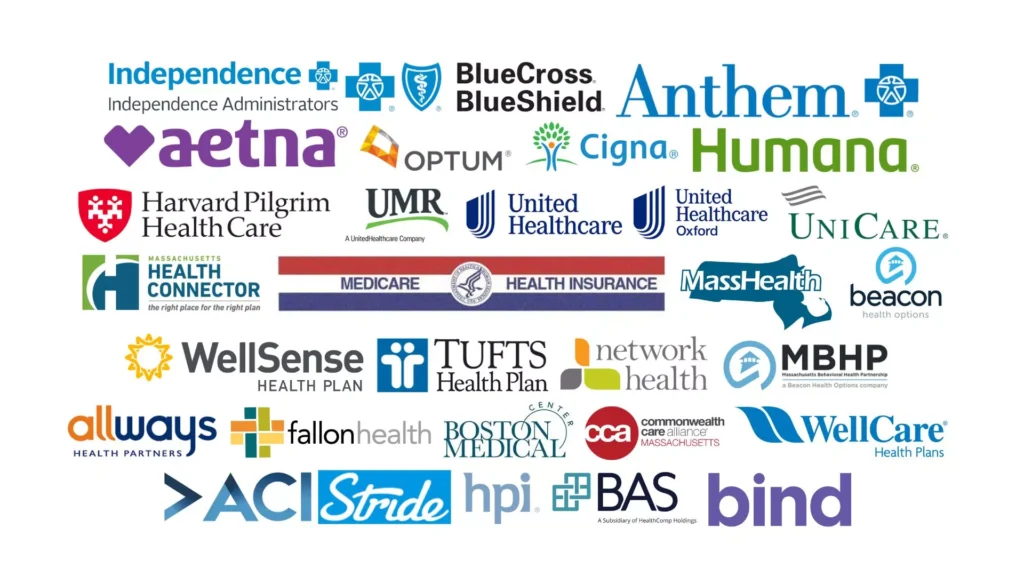
Treatment costs vary, but here are common ways to pay for care:
- Private Health Insurance: The Affordable Care Act and Mental Health Parity and Addiction Equity Act require most plans to cover substance use disorder services. We can help you verify your coverage.
- Medicare: Part A covers inpatient care, Part B covers outpatient services (IOP, PHP), and Part D covers many MAT medications. You can learn more about Medicare coverage for SUD.
- Medicaid: This program provides comprehensive coverage for low-income individuals and families, though benefits vary by state.
- State-Funded Programs and Sliding Scale Fees: Many states offer publicly funded rehabs, and some centers adjust costs based on your income.
- Payment Plans and Scholarships: Many facilities offer payment plans, and some non-profits provide grants or scholarships.
Navigating these options can be confusing. At Addiction Helpline America, we help you understand your benefits and connect you with facilities that fit your financial situation. For more information, see our guide on How Much Do Alcohol Treatment Centers Cost?.
Recognizing the Need and Taking the First Step
Recognizing the need for help is the hopeful first step toward healing. Addiction often creeps in gradually, but certain signs indicate it’s time to seek help for yourself or a loved one.
Signs of Addiction:
- Behavioral Changes: Increased secrecy, neglecting responsibilities, legal troubles, and continuing use despite negative consequences.
- Physical Symptoms: Changes in appearance (poor hygiene, weight changes), bloodshot eyes, frequent illness, withdrawal symptoms (tremors, nausea), and increased tolerance.
- Social Withdrawal: Isolating from family and friends, losing interest in hobbies, and strained relationships.
If you see these signs, it’s time to reach out. For immediate help in a crisis, call or text the 988 Suicide & Crisis Lifeline. If the situation is life-threatening, always call 911 first.
Making the call for help is an act of courage. When you contact Addiction Helpline America, you’ll speak confidentially with a specialist who understands and wants to help. This is followed by an initial assessment, where a professional will ask questions to understand your unique situation and match you with the right drug rehab program.
This journey begins with one small step. Our Substance Abuse Help Guide offers more resources to support you. You don’t have to do this alone; we’re here to walk beside you.
Frequently Asked Questions about Drug Rehab Programs
Here are answers to some of the most common questions about drug rehab programs.
What are the success rates of drug rehab programs?
Addiction is a chronic, relapsing disease, similar to diabetes or hypertension. Relapse doesn’t mean treatment has failed, but that adjustments are needed. Studies show addiction treatment has similar success rates to other chronic conditions, with relapse rates of 40-60%. The majority of patients eventually stop compulsive use.
Success is measured by more than just abstinence; it includes improved health, better social functioning, and improved quality of life. The most significant factor is treatment duration—staying in treatment for three months or longer dramatically increases the likelihood of long-term recovery.
How do support groups and recovery communities fit into rehab?
Support groups are a vital part of recovery, providing a community of peers who understand your journey. This peer support model reduces isolation and shame.
- Recovery groups like 12-step programs (Alcoholics Anonymous, Narcotics Anonymous) and secular options (SMART Recovery) offer structured support.
- A sponsor—someone with sustained recovery—can offer one-on-one mentorship.
- These communities help you build a new, sober social network.
Many drug rehab programs integrate these groups into their treatment, and they often become a lifelong resource. Learn more about 12 Step Promises.
How do I find the right drug rehab program for my needs?
Finding the right drug rehab program involves several key steps:
- Get a Professional Assessment: An addiction specialist can determine the appropriate level of care for your situation.
- Ask Questions: Inquire about treatment philosophy, therapies used, staff credentials, program duration, aftercare, and cost.
- Verify Credentials: Ensure the facility has state licensure and, ideally, national accreditation from the Joint Commission or CARF. Use SAMHSA’s FindTreatment.gov to check.
- Match Needs to Services: If you have specific needs (e.g., you’re a veteran or need dual diagnosis care), find a program that specializes in that area.
Using a helpline like ours simplifies this process. At Addiction Helpline America, we provide free, personalized guidance to connect you with a vetted program that fits your needs, location, and financial situation. Our guide on How to Find the Right Rehab Center offers more tips.
Call Now – Your Journey to Recovery Begins Today!

Take the first step towards a healthier life! Call now to connect with our compassionate team and start your recovery journey today. Your path to healing awaits!
Our recovery specialists are available 24/7 to provide support, and all calls are confidential and free. Reach out anytime – we’re here to help!
Conclusion: Your Path to Recovery Starts Here
Seeking answers about drug rehab programs is a courageous first step. We’ve covered the essentials of effective treatment: a spectrum of care levels, evidence-based therapies, individualized planning, and robust aftercare. We’ve also highlighted the importance of integrated mental health services, family involvement, and specialized programs.
Here is the most important takeaway: addiction is a treatable chronic disease. It is not a moral failing. Research proves that people who engage in treatment—especially for three months or longer—achieve lasting recovery. It happens every day, and it can happen for you.
Taking the next step can feel overwhelming, but you don’t have to do it alone.
At Addiction Helpline America, our specialists are available 24/7 to provide free, confidential support. We listen without judgment and help you connect with a drug rehab program that fits your unique needs. We serve individuals and families in Alabama, Alaska, Arizona, Arkansas, California, Colorado, Connecticut, Delaware, Florida, Georgia, Hawaii, Idaho, Illinois, Indiana, Iowa, Kansas, Kentucky, Louisiana, Maine, Maryland, Massachusetts, Michigan, Minnesota, Mississippi, Missouri, Montana, Nebraska, Nevada, New Hampshire, New Jersey, New Mexico, New York, North Carolina, North Dakota, Ohio, Oklahoma, Oregon, Pennsylvania, Rhode Island, South Carolina, South Dakota, Tennessee, Texas, Utah, Vermont, Virginia, Washington, West Virginia, Wisconsin, Wyoming, and the District of Columbia.
Your journey starts with reaching out. Whether you need a local program like one in Riverside County or specialized care elsewhere, we can guide you. The path isn’t always easy, but it’s worth it. We’re ready when you are.
Our helpline is 100%
free & confidential
If you or someone you care about is struggling with drug or alcohol addiction, we can help you explore your recovery options. Don’t face this challenge alone—seek support from us.
Programs
Resources
Will my insurance
cover addiction
treatment?
We're ready to help
Find the best
drug or alcohol treatment
center
Are you or a loved one struggling with addiction? Call today to speak to a treatment expert.




